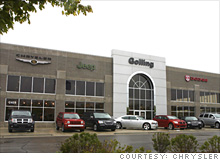A (positive) view from the showroom
Drastic dealership cuts at GM and Chrysler may have a silver lining, says one former dealer.

 |
| Jeffrey F. Knott, a dealer for 20 years, is president of showroomtoday.com and the author of "From Zero to Hero: How to Master the Art of Selling Cars." He's based in Melbourne, Fla. |
NEW YORK (Fortune) -- The U.S. auto industry's deep-seated problems make it easy for car dealers to focus on the negative. As if thousands of cars sitting unsold on lots and in showrooms across the country weren't enough, recently bankrupt Chrysler will cut 789 of its nearly 3,200 dealer relationships, and General Motors will end contracts with 2,600 franchises through 2010 in an effort to avoid Chapter 11.
As someone whose business and income has been directly affected by the economy and the state of the auto industry - I spent 20 years as a dealer and now consult for them full-time - I feel for those who will lose their jobs and businesses. But believe it or not, this contraction may be a good thing. The dealership closings are painful, but it's an overdue shakeup for an inefficient dealership system that will ultimately benefit showrooms, carmakers - and consumers.
It's long been evident that there were too many dealerships. Competing franchises often sell similar products less than five miles apart - it's not uncommon to find Dodge franchises right next to Chrysler dealerships or Chevrolet lots neighboring GMC and Pontiac dealers, all of them basically selling the same wares.
And in recent years, many dealers were pressured to take unneeded inventory from the manufacturer or were shunned for turning it away, adding to the inefficiency. In short, domestic automakers have become the perfect example of supply outpacing demand.
As a result, many domestic dealerships' new-car departments have operated at a loss for years, being kept afloat only by their fixed operations and used-car departments, which traditionally make dealers the most money.
At the same time, foreign dealers have done it better. Toyota (TM), Honda (HMC), Nissan (NSANY), and other international franchises sold more cars using fewer showrooms. Toyota, for example, was the number one selling brand in the United States in 2008, but has a fourth as many dealerships as GM nationwide.
The U.S. dealers that survive today's cuts will be stronger, giving Chrysler and General Motors (GM, Fortune 500) a much-needed boost. Instead of cannibalizing each other's sales, they'll gain market share and be better positioned against the foreign brands. And generally, dealerships will be worth more.
For consumers, the effect may be more mixed. Car shoppers might need to drive further to get to their favorite automaker's dealership, and with fewer of the same dealers for the same models, negotiating back and forth for the lowest price won't be possible. But dealer consolidation could improve the experience of servicing a car, as only the best technicians are likely to remain in the market.
Whatever the overdue improvements, revamping the dealership model won't bring auto sales roaring back this year. While some say there will be a pent-up demand for automobiles, it's an optimistic perspective at best; we thought the same thing a year ago, and things have clearly gotten worse.
Sales will certainly build back up eventually, but this will be a new era for our industry. Before, consumers were buying and trading in cars much more often, and banks were only too happy to oblige, even if it meant that they were financing vehicles at 150% of their value to make financing work for the dealers.
Now, with banks having backed off on their advances, customers will be forced to keep their vehicles longer. They'll either have to put more cash down for a new car, or wait until they have real equity in the one they have to trade it for another. But that's probably what they should have been doing in the first place.
So all is not lost. U.S. auto dealers that escape the drastic cuts by GM and Chrysler will be held to higher performance standards -- a small price to pay for staying open. And with supply finally meeting demand, there will be more customers, less competition, better service - and maybe, just maybe, a renewed and valid sense of optimism. ![]()
-
 The retail giant tops the Fortune 500 for the second year in a row. Who else made the list? More
The retail giant tops the Fortune 500 for the second year in a row. Who else made the list? More -
 This group of companies is all about social networking to connect with their customers. More
This group of companies is all about social networking to connect with their customers. More -
 The fight over the cholesterol medication is keeping a generic version from hitting the market. More
The fight over the cholesterol medication is keeping a generic version from hitting the market. More -
 Bin Laden may be dead, but the terrorist group he led doesn't need his money. More
Bin Laden may be dead, but the terrorist group he led doesn't need his money. More -
 U.S. real estate might be a mess, but in other parts of the world, home prices are jumping. More
U.S. real estate might be a mess, but in other parts of the world, home prices are jumping. More -
 Libya's output is a fraction of global production, but it's crucial to the nation's economy. More
Libya's output is a fraction of global production, but it's crucial to the nation's economy. More -
 Once rates start to rise, things could get ugly fast for our neighbors to the north. More
Once rates start to rise, things could get ugly fast for our neighbors to the north. More








